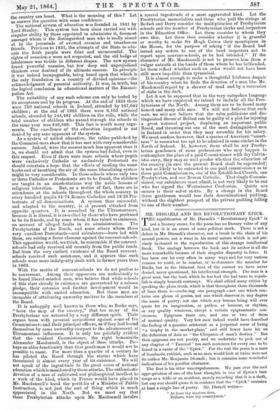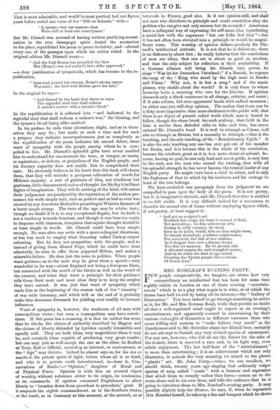MR. DISRAELI AND HIS REVOLUTIONARY EPICK.
THE republication of Mr. Disraeli's "Revolutionary Epick" is not a literary event, for the poem has no literary value of any kind, but it is an event of some political mark. There is not a defect in Mr. Disraeli's character, not a break in the chain of his mental powers, not a want in his moral nature which is not pre- cisely indicated in the reproduction of this strange intellectual freak. The analogy between the book and its author is all the more remarkable because of their singular disparity in force. It has been our lot very often in many ways and for very various reasons to resist, or to combat, or to denounce the member for Bucks, but in the bitterest heat of the contest we have never denied, never questioned, his intellectual strength. The man is a great man, but the book which he has had the bad taste to repub- lish is simply beneath contempt. We shall offend many critics by speaking the plain truth, which is that throughout these thousands of lines there is--excluding one paragraph—not one which con- tains one gleam of genius, not one which deserves in any degree the name of poetry, not one which any human being will ever quote for its imagination, or pathos, or humour, or rhythm, or any quality whatever, except a certain epigrammatic con- ciseness. Epigrams there are, and one or two of them of unusual quality. Very few men indeed would have described the feeling of a genuine aristocrat as a perpetual sense of living "a trophy in the marketplace," and still fewer have hit on the definition of Asia as "the Cleopatra of man's destiny." But then epigrams are not poetry, and we undertake to pick out of any chapter of " Tancred " ten such sentences for every one to be found in a canto of the "Epick." For the rest the poem is a mass of bombastic rubbish, such as no man would look at twice were not its author Mr. Benjamin Disraeli; but it contains some wonderful indications of his peculiar character.
The first is his utter unscrupulousness. We pass over the cool
appropriation of one of the best thoughts in one of Byron's best songs as a trifle or an accident, merely recording that it is a theft, lest any one should quote it in evidence that the "Epick" contains at least a single line of poetry. Mr. Disraeli writes- " At least thy masters then, Italians, were thy countrymen."
That is most admirable, and would be most poetical, had not Byron years before ended one verse of his " Ode to Salamis" with-
" A tyrant—but our masters then Were still at least our countrymen."
But Mr. Disraeli was accused of having written justifying assassi- nation in the true demagogic spirit, denied the accusation
in his place, republished his poem to prove its falsity, and—altered every one of the passages upon which his critics relied. In the original edition Mr. Disraeli wrote-
" And the bold Brutus but propelled the blow Her (Rome) own and nature B laws alike approved," —a clear justification of tyrannicide, which has become in the re- publication, "Immortal poured her stream, Rome's strong career Was mine ; the blow bold Brutus gave her fate."
In the original he says- " And blessed be the hand that dares to wave The regicidal steel that shall redeem A nation's sorrow with a tyrant's blood."
In the republication it is softened into "and hallowed be the regicidal steel that shall redeem a nation's woe," the blessing, and the tyrant's blood being alike omitted.
In his preface he calls these alterations slight, and so in them- selves they may be ; but made at such a time and for such a purpose they indicate unscrupulousness just as completely as the republication of the poem indicates his second defect, utter
want of sympathy with the people among whom he is com- pelled to live. Mr. Disraeli's splendid gifts have never enabled him to understand for one moment the tone, or temper, or wants, or aspirations, or defects, or prejudices of the English people, and his literary capacity does not enable him to comprehend their taste. He obviously believes in his heart that this book will charm them, that they will mistake a pompous collocation of words for Miltonic majesty, a sort of gustiness of idea, not windiness but
gustiness, little disconnected rushes of thought, for Shelley's brilliant flights of imagination. They will do nothing of the kind, will unless their judgments are paralyzed by the reputation of the author pro- nounce his work simply rant, rant as perfect and as bad as ever was
uttered by any American Methodist preachingto Western farmers off a burnt maple stump. The taste of the age may be a false taste, though we doubt if it is in any exceptional degree, but its fault is not a tendency towards bombast, and though it can bear too easily to dispense with clearness, itrequires that mystic thought should be at least simple in words. Mr. Disraeli could have been simple enough. No man alive can write with a more colloquial directness, or has less need to employ what Macaulay called Turkey-carpet colouring. But he doss not sympathize with the people, and so instead of giving them diluted Pope, which he could have done admirably, he tries to offer them peppered Milton, and makes a miserable failure. He does just the same in politics. When people want guidance as to the next step he gives them a speech—very wonderful in its way—about England not being a European State, but connected with the world of the future as well as the world of the present, and when they want a principle for their guidance tells them their next and most clear duty is to keep the surplus they have earned. It was just that want of sympathy which made him at the beginning of the session talk of the " insanity " of war with Germany, and which will at the end of it probably make him denounce Denmark for yielding over readily to German
influences.
Want of sympathy is, however, the weakness of all men with
cosmopolitan views ; but even a cosmopolitan may have convic- tions. If this poem has a meaning, it is that its author has none, that he thinks the claims of authority described by Magros and the claims of liberty defended by Lyridon equally irresistible and equally null. They are both ideas, very magnificent ideas it may be, and certainly ideas capable of producing very great results ; but one may just as well accept the one as the other, be Radical or Tory, Red or Official, according as interest, or convenience, or the " Age " may dictate. Indeed he almost says so, for his dea ex tnachina, his potent spirit of light, before whom all is to bend, and who is to govern earth henceforward, is—hear it, Con- servatives of Bucks !—" Opinion," daughter of Moral and
of Physical Force. Opinion is with him an avowed object of worship without reference either to its origin, its tendencies, or its commands. If opinion command Englishmen to allow liberty to "broaden down from precedent to precedent," good. If it suspends the eighth commandment, as in the Southern States, or the tenth, as in Germany at this moment, or the seventh, as at
intervals in France, good also. Is it not opinion still, and shall not men who disbelieve in principle and evade conviction obey the goddess who can give not only success but its rewards ? Americans have a colloquial way of expressing the self-same idea repudiating a moral law with the argument "but our folks feel that "—but it has not often been elevated into a principle in would-be magni- ficent verse. This worship of opinion defines precisely Mr. Dis- raeli's intellectual attitude. It is not that he is dishonest; there is no dishonesty about him ; he really believes that the convictions of men are ideas, that one set is about as good as another, and that the only subject for reflection is their availability. If a German alliance will bring his friends into power, he sings "Was ist der Deutschen Vaterland ;" if a Danish, he repeats the song of the "King who stood by the high mast in Smoke and Flame." Why not, it is but a song ? and if the music pleases, why stickle about the words? It is only those to whom harmony lacks a meaning who care for the libretto. If opinion demands only a blank resistance to all change, criticize, and resist ; if it asks reform, bid over opponents' heads with radical measures ; in either case you still obey opinion. The notion that there can be a duty more imperative than mere obedience to the public will, that there is an object of pursuit called truth which man is bound to follow, though the chase break his neck ,midway, that faith in the false is nobler than disbelief alike in false and true, has never entered Mr. Disraeli's head. It is well to triumph as Coml., well also to triumph as Brutus, but a necessity to triumph,—that is the teaching, and the sole teaching, of the "Revolutionary Epick." It is also the sole teaching any one has ever got out of the member for Bucks, and it is because this is the whole of his conviction, because his intellect, great as it is, is a mere chemical solvent, be- cause, having no goal, he can only lead and never guide, is only first in the rush, not the man who caused the rushing, that with all his splendid strength he has never become the trusted leader of any English party. He might have been a chief in either, and is only the fugleman of that to which by his instincts and his courage he least of the two belongs.
We have excluded one paragraph from the judgment we are compelled to pass upon the body of the poem. It is not poetry, but it is imaginative rhetoric, and Mr. Disraeli therefore is entitled to its full credit. It is very difficult indeed for a statesman to describe the second rise of Rome without employing figures which, if notpoetry, at least suggest it.
tt And yet no sculptor's art Moulded this shape, for form it seemed of flesh, Yet motionless; its dim unlustrous orbs
Gazing in stilly vacancy, its cheek .
Grey as its hairs, which, thin as they might seem, No breath disturbed; a solemn countenance, Not sorrowful, tho' full of woe sublime, As if despair were now a distant dream Too dim for memory. By its gloomy side A shivered sceptre lie, and trampled crown; And on its robes the dust of age rested., Crusting the Tyrian purple like a stream Of frozen lava."































 Previous page
Previous page